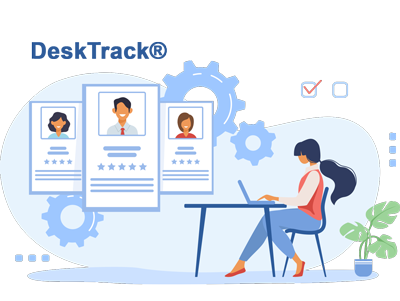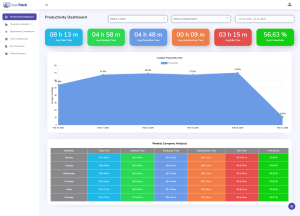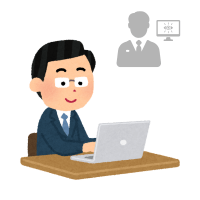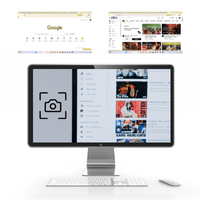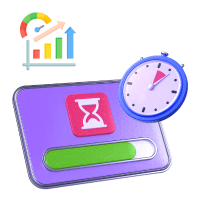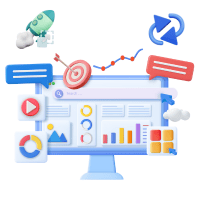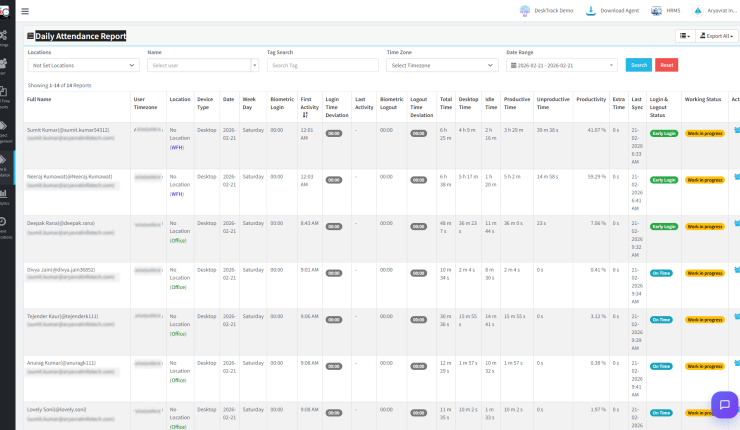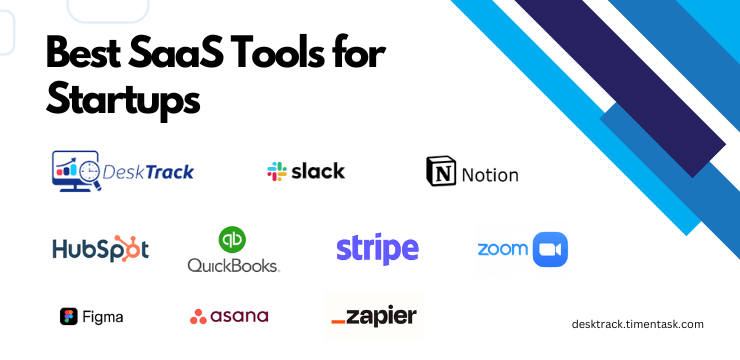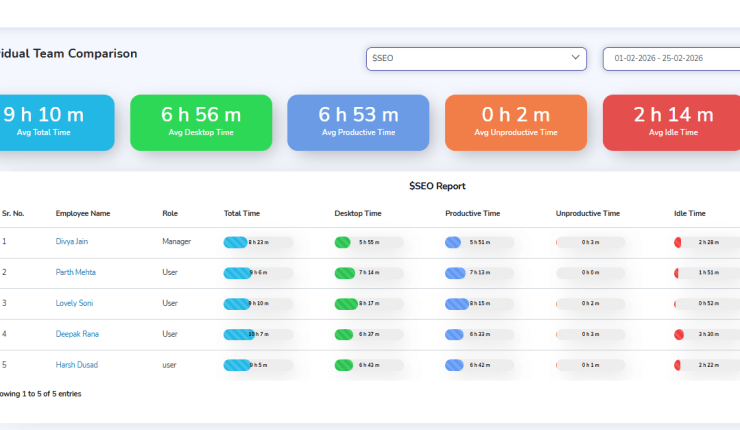We are in the work era where “exact” brings success and growth regardless of your business size and sector. So you require ditching the guesswork.
Might we recommend time tracking software? However, isn’t that spying on employees or a workaround to increase their workload? It’s anything but that.
The global software for work hours tracking market is $5.75 billion and we can expect a spike of $25.48 billion by 2032.
More and more industries are accurately tracking the work-time of their employees to get a competitive edge, especially against businesses, which need to be using such tools and applications.
Don’t believe us? The fact that US economy alone loses 50 million productivity hours daily because of unrecorded work activities. That’s why it’s a must to use time tracking software.
In today’s blog, we will take a look at the major industries that use software to track employee time. Plus, we will also see the countries and usage stats for the same. So let’s get right into it.
Today’s Time Tracking Software Post at a Glance:
In a hurry? Here’s a summary of what we have covered in this blog.
- The US economy alone loses 50 million productivity hours per day due to unrecorded work activities.
- The global software for work hours tracking market is $5.75 billion and we can expect a spike of $25.48 billion by 2032.
- Time tracking software solutions accurately track employee hours.
- Such tools and applications have features and functionalities to help you maintain optimal work-time utilization.
- Too much use of time tracking software can be a disadvantage. You need to make flexible time tracking policies.
- Although time tracker tools are ideal for all sectors, industries such as IT, restaurants, logistics, construction, retail, fitness, healthcare, and manufacturing will benefit the most from using them.
- Choosing the ideal time tracker for your business as per your requirements is a must.
What is Time Tracking Software?

Simply put, software for tracking your time records hours. However, it does the job more accurately than us as it uses the capabilities of integrated AI and automation. Plus, it also eliminates the burden of manually noting your time.
The best thing about these software solutions is that they are available in multiple versions. For instance:
- Mobile apps
- Desktop apps
- Web applications
- Browser Extensions
- Wearable apps
As per our experience and expertise, such software solutions have the most advanced, practical, useful, and intuitive features and functionalities.
At a glance, these include automated timers, activity categorization, and integrations. Overall, with these solutions, you can increase focus and efficiency, accrue payroll, and boost employee work performance. Come to think about it, time trackers can even increase efficiency in your daily house duties.
Read Also: Employee Performance Tracking: The Complete Guide
Why Businesses Need Time Tracking Software: Features and Benefits
![]()
Time tracking software solutions are functional and feature-rich. That’s why we are here. Still wondering whether it is right for your business? Here’s how it can enhance employee work-time utilization.
1. Hours Tracking
This feature of the software tracks your time down to the last second. The idea is for you to get a minute-by-minute report of where your employees utilize their work hours. What this does is let you:
- Identify work gaps, obstructions, flaws, and non-productive work hours.
- Steer your teams in the right direction for maximum efficiency by evaluating detailed reports.
- Improve overall employee work-time utilization.
2. Timesheets
In short, you can think of timesheets as the digital versions of pen and paper attendance sheets. However, these contain time blocks to give you a detailed view of your employees’ work-time utilization.
Generally, timesheets contain elements including time blocks, task names, project names as titles, break time, idle time, and employee clocking time.
3. Integration
Typically, most time tracker tools can integrate with the other tools. What this does is make it convenient to access the features of the commonly used apps instantly, which saves valuable time. To give you an instance:
- You can integrate your time tracking software with your payroll tool.
- This allows you to directly send work hours data for payroll processing.
- Plus, you can also access the features of your payroll tool from your hours tracker software and vice versa.
- It reduces the time it would otherwise take you to switch between your payroll and time tracker tools to access diverse data.
4. Timers
Software for tracking your time provides automated or one-click timers, which you can use to track activity hours. The most useful thing about it is you can run and manage multiple timers simultaneously. Especially, when you have multiple tasks. For instance.
- A website development project may have multiple tasks including:
- Drafting designs
- Adding placeholder content and images
- Coding the design
- Adding actual content (that makes sense)
- Staging the website
- Making the website live
- During this process, staging and making the website available for public access are tasks that run simultaneously.
- These tasks are connected to the content writer’s task of researching, writing, and sending quality content for adding to the website.
From this practical instance, we can see how running and managing multiple timers can enhance teamwork. The above was just one example but you get the picture!
5. Detailed Insights
Time tracking software solutions provide detailed work-time utilization insights into your employees’ work activities. Usually, these are in visuals such as charts for a better understanding of employee efficiency. Evaluating these details lets you:
- Make better data-driven decisions to improve employee performance.
- Identify and prevent employee pain points and insider threats as you efficiently evaluate work gaps.
- Optimize workflows by assisting in assigning the right teams and resources to the right projects and tasks.
6. Activity Time Categorization
These software solutions can also categorize activity time for detailed understanding. For example:
- Productive time
- Unproductive time
- Work time
- Break time
- Idle time
- Non-work activity time
- Clocking time
- Time deviations between the clock in and system log on and system log off and clock out.
- Meeting time (idle time conversion)
These are based on your customizations, configurations, and the tool’s AI capability to smartly categorize work hours. Using this data, devising the best strategies to improve work-time utilization performance becomes simple.
7. GPS and Geofencing
Software solutions for tracking time also provide advanced GPS and geofencing time monitoring features. Both are the best for remote and onsite teams. However, these features differ in workings.
- GPS: You guessed it right. We use this feature to track employee time location-wise. GPS is better for tracking employee locations.
- Geofencing: It is the same as putting up a virtual fence around an area. This advanced feature sends alerts and notifications once someone or something moves in or out of the geofence. Geofencing has practical applications in workplace security.
Read Also: Geofencing Management Software: The Complete Guide
A Few Disadvantages of Time Tracking Software
So far, we have seen the benefits of using time tracking software. However, just like anything else in your business, it is also an asset. So, it is no exception when it comes to having cons. Fortunately, there are only a few.
- Managing multiple timers can be complex. For instance, you might pause the timer on task B while the wait was for task A. This can have an errorful impact on payroll.
- When an employee is in the smooth flow of work, they may forget to start the timer and remember (regret) later. This again can affect the payroll if you have strict time tracking policies.
- Too much work-hour monitoring can feel intrusive. Employees may feel overwhelmed, stress, and burnout.
Your solution is to have a flexible time monitoring policy, train employees to properly use the software, and provide breaks to employees.
Industries Where Time Tracking Software Is the Most Useful
![]()
Although work-hour tracking software has applications in various sectors worldwide, there are some industries where it has the most practical uses.
1. IT
Managing multiple teams, modules, and the various stages of developing software are all part of the IT sector. Plus, don’t forget that developers have to simultaneously handle multiple projects. Time software here is beneficial as it synchronizes and enhances teamwork with:
- The capability to run and manage multiple timers.
- The feature for tracking time across various activities and tasks.
- The detailed real-time insights feature, which lets team leaders know the status of work. This feature helps in planning the best non-overwhelming strategies for completing projects and delivering top-quality work.
2. Healthcare
The software for tracking time for businesses is a lifesaver in the healthcare industry. Not only hospital administrators can track the staff’s work-time utilization and status but it is also useful for doctors and nurses.
Since doctors and nurses are always on the move, the work-hour tracker software’s mobile version plays an important part in accurately tracking work-time. Plus, the GPS tracking feature can help you identify how much time the assigned healthcare specialist is giving to each patient.
3. Food & Restaurant
There is so much going on inside and outside the kitchen in restaurant businesses. Each staff member must work in perfect coordination to satisfy customers. Using time tracking software here just makes this simpler and less stressful. Let’s give you an example of how this software can enhance synchronization and teamwork.
- The head chef starts the timers on food preparation and other stages.
- As soon as each meal is finished cooking, the individual chefs stop their timers.
- The waiter collects the order and starts the timer for the task, for example, “put on table 10” and records their time for the task.
- During this time, if any customer complains about food quality, the respective timer must be paused.
All this can be confusing during first-time implementation. However, over long-term usage, the software will significantly improve efficiency. Furthermore, time tracker tools also help in coordinating food supply, inspection, logistics, customer feedback implementation, and a lot more in this industry.
4. Fitness
Gym administrators can use such software to identify how much time each trainer is giving to each customer. Since you will get detailed insights, spotting the lazy or slacking-off gym trainers will become simple.
This way, you will save unnecessary expenses, which you can invest in buying new, better, and advanced equipment. Sincere gym trainers can use such software to identify whether they are paying equal attention to each fitness enthusiast or not.
5. Manufacturing
The manufacturing industry has great use of time tracking software. For example, you can track delays in raw material delivery using this tool or track the efficiency of your workers using the mobile versions.
6. Construction
The construction industry has a similar use of this tool to the manufacturing industry. However, the GPS tracking and geofencing features have practical applications here as they can track the routes and times spent on each site.
7. Retail
Retail shops benefit a lot from this tool. Tracking time can help you establish coordination with suppliers and wholesale warehouses.
8. Logistics
The logistics industry has something or other to do with all the other industries we have mentioned so far. This industry is involved with heavy packing and moving, tracking which can become simple by using mobile time trackers and IoT apps.
9. Law
Law firms and lawyers worldwide benefit from using software for tracking work hours. Since lawyers have to handle multiple clients and thus make multiple bills, under or overbilling can be a big issue. Work-hour tracker tools can help lawyers:
- Accurately track their work-time.
- Get detailed analytics and reports to prove to clients how much they worked.
- Accurately bill their clients and strengthen their trust.
- Simultaneously manage multiple cases without getting overwhelmed and improve their work-time-utilization efficiency.
10. Accounting
Accounting firms worldwide use time tracking software to boost efficiency, productivity, and work performance. Talking about practical applications, the software assists accountants in:
- Accurate billing and invoicing.
- Simultaneously handling multiple clients and projects.
| Industry | Key Countries Using Time Tracking Software in These Sectors | Usage Stats | RoI (Return on Investment) |
| IT | China, Japan, India, North America | 60-80% | 22% productivity boosts |
| Healthcare | The USA, Japan, China, India | 50-70% | 50% time reduction in administrative tasks |
| Food and restaurant | India, Japan, China | 60-80% | Up to 10-15% labor costs saved |
| Fitness | Australia, the USA, the UK, Canada, Germany, France, India, Mexico, Brazil, South Korea | 50-70% | Up to 10-15% labor costs saved |
| Manufacturing | South America | 70-85% | 20-25% reduction in overtime costs |
| Construction | The USA, Russia, the UAE | 60-75% | 20% productivity boosts |
| Retail | The UK, Canada, Australia, Germany, France, India, Mexico, the USA, Brazil, South Korea, Japan, Italy, South Africa, China | 60-80% | 15-20% productivity boosts |
| Logistics | Singapore | 70-85% | 20-25% increase in scheduling accuracy |
| Law | Spain, Germany, Greece, France, Italy, the USA | 80-90% | 10-20% increase in billable hours |
| Accounting | The USA, the UK, Canada, Australia, Germany, India, the Netherlands, South Africa, New Zealand, Singapore, Sweden, Norway | 30-80% | 10-20% increase in billable hours |
How to Choose Your Ideal Time Tracking Software?
![]()
So now you know that the said software is right for your business. However, which one? Yes. Here’s your problem. There are almost unlimited work-hour trackers available in the market. Plus, you don’t want to end up buying a fake. So here’s what to do.
1. Sort Out Your Requirements
What will the software solution do for you? Do you only need essential time tracking features or also need advanced integrations? Jotting down the answers to these questions will help you shortlist the best options.
- Our expert tip here is to verify the authenticity of the time tracking software tool before including it in your shortlist.
2. Analyze the Budget
As we mentioned before, work-hour tracker tools are an asset. Unlike every other asset in your business, you also need to have a budget for it. You don’t want to end up spending a big expense on an asset, which is a part of your efficiency-boosting strategy and not the entire strategy.
- Usually, software solutions in this category are affordable for all businesses. However, we still recommend having a budget. Especially to small businesses.
3. Shortlist the Top Options
Now that we have our requirements down and have set aside a budget, we can shortlist the top software for tracking time for businesses based on these analytics. This list will only have the most useful tools as per your organization’s needs.
- You need to select your ideal tool from this list, which will only need some extra research time.
4. Identify the Actualities
We mean read reviews from businesses who are using the tool. Doing so will help you identify how much return on investment you will get from it.
5. Test the Software
By now you must have finalized the best work-hour tracker for your business. However, still, you can’t be sure without a test run of the free version or a free trial for the paid version.
Read Also: Top 10 Time Tracking Apps for iPhone in 2025
The Future of Time Tracking Software
Tools for tracking your work hours are advanced applications now. However, we can expect the most unbelievable updates and upgrades in the future. From the use of AI and automation to wearable devices and IoT integration, time tracking software is becoming more and more convenient to use.
Although the applications will and are getting simpler the features and functionalities will get more powerful seeing the current scenario. Overall, the aim is to accrue business workflows and leverage technology to reduce the burden as much as possible.
Conclusion
So that was all about time tracking software and its practical applications in multiple industries. As a final word, we can say that sectors that use time trackers are more productive and efficient than the ones that don’t. This has been proven by facts, stats, and surveys. Thus, it’s undeniable that work-hour tracker tools are a must-implement for businesses in all major sectors. Implementing these software solutions is your sure shot way to more return on investment as it significantly improves work-time utilization and employee work performance, regarding which we have seen many instances. Overall, properly utilizing employee work-time monitoring tools stabilises the workflow integrity in your organization.
Frequently Asked Questions (FAQ)
Q. How Can You Track Your Employees’ Time?
Ans. You can track the work-time of your employees using time tracking software or manual timesheets. However, since timesheets are cumbersome and difficult to maintain, businesses often use the former.
Q. What is Time Tracking Software?
Ans. Time tracking software solutions record hours. However, these tools do the job more accurately than us as they use the capabilities of integrated AI and automation. The best thing about these software solutions is that they are available in multiple versions including wearable apps, desktop apps, mobile apps, browser extensions, and web applications.
Q. Why Do We Use Time Tracking Software?
Ans. Businesses use time tracking software solutions to improve employee efficiency and productivity. The software tracks and reports insights into how your employees utilize their work-time. Evaluating this data, managers get a fair share of where their employees lack including work gaps, flaws, non-productive work patterns, and obstructions.
Q. Which are the Industries where Time Tracking Software is the Most Useful?
Ans. Although it has applications in every sector, businesses in these industries benefit the most from using time tracking software:
- IT
- Healthcare
- Food & Restaurant
- Fitness
- Manufacturing
- Construction
- Retail
- Logistics
- Law
- Accounting
Q. Which are the Best Time Tracking Software Solutions?
Ans. To help you choose your ideal time tracking software, we shortlisted 10 of the best options.
- DeskTrack
- DeskTime
- Harvest
- Time Doctor
- TimeCamp
- Hubstaff
- Insightful
- ActivTrak
- Clockify
- Toggl Track

